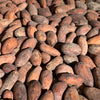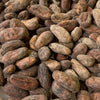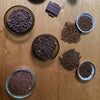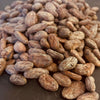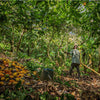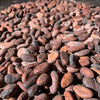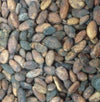Ecuador Costa Esmeraldas 2023 Direct Trade
Characteristics
Origin: Ecuador
Region: Single estate Muisne in the Esmeraldas province
Type: Ecuadorian Nacional hybrids: EET-95, EET-96, EET-103
Certifications: Direct Trade, Uncertified Organic
Year: 2023
As always, the preparation is perfect on this lot. Very even and no debris to speak of with a beautiful red/auburn color.
The overarching impression for this bean is nuance and elegance. The aroma starts off with chocolate and lightly toasted warm cedar. The solid chocolate backbone is backed with delicate wood tannins and brown sugars.
This year I'm finding the integration of flavors even better than previous years. The flavor starts off with fudge brownie and those bittering wood tannins. There is a creamy, slight nutty note that is clean but earthy. I can't quite put a name too it. The inherent dark brown sugar sweetness and bitterness lend a note of a rich mocha sense. These year we are treated with apricot jammy goodness. The acidity balance is perfect leaving you with an unmistakable satisfaction.
Details
The cocoa orchards were established 6 years ago on former cattle pasture with very steep terrain. Establishment of cocoa, timber, and other fruit trees has reduced erosion on the farm site. Esmeraldas has an unusual climate, with little variation in average temperatures. The region has relatively short wet season from January to May each year, but during the dry season, the weather is almost always overcast with light drizzling rain.
Costa Esmeraldas is a family owned and operated 100-hectare cacao farm. All members of the Salazar family (Fredy, Monica, and siblings Freddy and Indira) actively participate in the business. Freddy is directly responsible for managing operations at the farm and post-harvest center.
Management of the cacao orchards create over 40 full-time jobs within the local community in rural Esmeraldas.
Fermentation is set up a five-tiered cascade system. The wood boxes are Cedro (Cedrela odorata) with a 450 kg capacity. The fermenting mass is turned once at 36 hours, and then every morning until fermentation is complete. Total duration of fermentation is 5 ½ days.
This mixture of varieties combined with frequent collaboration with Daniel O’Doherty of Cacao Services, produces a unique profile
Dan's influence in the fermentation is quite clear with a very even, beautiful and full fermentation. You can taste another bean collaboration with Peru Ucayali
Roasting
The roast profile for my evaluation was 13:50/16:25/20:55 @ 251 F. Generally speaking you are going to want to take it easy on the throttle here. With the nuts present you run the risk of making them bitter. Likewise I've found Costa Esmeraldas does not like a high EOR for the same reason. Fortunately the bean announces this very nice with sharp aromas. When you get those, whatever your method, turn the power down.
Drum Roasting
The specific profile I used on to evaluate this is 13:50/16:25/20:55 @ 251 F. You can come in pretty strong but you will want to pull the power back as you are coming into the end of the drying phase lest you have too much momentum. Keep backing off that power as the roast progresses or you run the risk of ending up with astringency because you did had to choose between too high of an EOR temperature (which will bitter it) or too short of a Finishing phase.
Behmor Roaster
Roast 2.5 lb if you can and use P1 on the one pound setting until you smell it going sharp and then turn it down. That should be around the 18 minute mark. Keep turning it down to keep the sharp aromas in check and stop the roast when you can no longer get the sharpness to go away. I was down to 25% power by the end for my evaluation roasts.
Oven Roasting
Pre-heat your oven to 350 F. Put 1-2 lb of beans onto a tray single layer deep. Check the temperature every 5 minutes, stirring at that time. When the beans are in the 205-215 range, reduce the oven temperature to about 10-15 F above your target EOR, so if you are going for 250 F, set it to 265 F. When the beans reach your desired temperature and/or are smelling sharp, another 15-30 minutes, remove them and let them cool. This should give you a nice fully developed roasted bean that is in little danger of being over roasted.
More From this Collection
